Since arriving on the New York City music scene with a unique brand of “gypsy punk” nearly 20 years ago, Gogol Bordello has continuously captivated audiences with their vibrant live shows and colorful cast of characters. Drawing on inspiration from around the globe, the band continues to push their sound with the release of their ninth album, Seekers and Finders, out on August 25th. We recently sat down with frontman Eugene Hütz at the Nancy Whiskey Pub, where we discussed the creative process, collaborations, and influences behind Gogol Bordello’s newest record.
It says here that you wrote this album over an extended time in 3 different continents, how long did you spend working on this new record?
I spent a slightly longer time I suppose. That’s like, a byproduct of producing a record yourself and trying to actually kind of prolong this experience of complete control … and you know, testing everybody else’s patience.
That’s a lot different than some musicians who just want want to hammer it out, and get it over with so they can go on tour.
That’s what we did with our last record, it was literally done in like 2 weeks. So I know we can do that. However, every record you make, for me, it’s … you set out to make another world, you know? And … what does it mean? A new world means a new rite of passage. So through it, the algorithm you hit and … book a new exotic location and bring everything, all the cellular memory you’ve got at this particular point of life and … get to it. Put it under a microscope and whip it and craft it, and whip it and craft it and shape it. You know?
Since you produced this album, I noticed there was almost, in the best way possible, a raw quality. Do you want to discuss that?
I can’t enjoy anything really, I mean I love garlic, you know? So that would be a pretty good starting point for overall sensibilities. I love spice of all kinds. I literally travel with a suitcase of my own spices.
Amazing. Like, for instance?
Actually, I’ve gotten pretty advanced. It’s like … actually my own, what do you call them …
You’ve got your own rubs and stuff like that?
What do you call it … proprietary blends. I mean, if you think about it, the whole exploration of the world was driven a lot by that. People say it was out of things like minerals and just greed and women and other kind of gluttonous motives behind it. I think that … that might be for the conquistadors themselves. But I think the people that funded the conquistadors … I think they just needed some turmeric or cardamom, and cayenne pepper. So on and so forth. And basil. A lot of really … you know they say variety is the spice of life. I think the spice is the fucking spice of life.
Writing in Latin America, in Eastern Europe, writing in these different places – how did that shape the writing process for you? How did that influence the record overall?
Well, everything has an influence. I don’t know if the influence really goes a far way. I think that when it really comes down to the writing process, influence takes a back seat and something else is happening where a focus, imagination allows us to process all this information in a completely different way. So my derived documentary experience that grows art, it grows to be artistic, only through imagination. For an example, the track “You Know Who We Are,” which is sort of a solidarity song with all the refugee camps around the world – the title already kind of says it all. Have I been to all of the refugee camps in the world? No, I’ve been to one. Having said that, I understand that there’s many different reasons why people become refugees. It has always been traumatic, however … that initial trauma of immigration and dislocation and carving out a new place for yourself in a new world. You can connect on that level. So here, it’s a transformative sort of affinity … kind of opening it up to all those experiences.
Or, another song, “Familia Bonfireball,” which sort of … you know, I was always in a band, since I was 14 years old. The song starts in a linear way. It’s a song about finding kinship and affinity with several souls around you, who are vibrating in a different frequency from everybody else. And then it’s this very intimate process. You know, you’re sort of open to the world, but for some reason you’re sitting with this one other person, or two other people and you go on this journey of creating something together. And very quickly, you understand that there’s actually this other attitude happening in your experience … it’s not like this high school sports team that’s whipped in shape by some dude, you know? There’s a dude that’s running the show and no one gets a fuckin’ say. This is different. This is … soon you realize you’re actually inventing your own family. And then as years go on you think, “Wait a second, how come 100 years ago there were no bands?” I mean, there was music, there were composers, there was the orchestra, and soloists, but it was still more like a coach whipping everything together. So why is it, that there’s millions of bands now? Because there is an inherited dysfunction of family in society. People are going out to try and start a new family, an alternative family. They might not realize this, but that’s what it is. In our band, we realize this.
As an audience member, that’s very apparent. I’ve seen your live show and there’s a family up there. I see that.
It’s quite apparent within the band too, which allows for the band’s unique path and great joy of doing that path. It essentially allows touring to be fun. As you know, most musicians hate touring. They just don’t know why they’re there. I can tell you why we’re there – because the ultimate payoff, I mean, aside from making a living … the ultimate payoff is actually on stage, in catharsis of it all. That’s the actual hardest currency there is, for us.
In the song I previously mentioned, “Familia Bonfireball,” the larger picture again is yes, it’s a family, but nobody says family’s perfect. So it’s this family, but there is an ongoing awareness that everyone is still on a journey of their own. It’s the reality of life. So that subject also allows me to write in a way that … maybe in the past I was more attached to a linear style of writing, but I think here it’s more … the story starts linear but then it becomes this story of … an emotional story. Maybe just more of a story of … it shifts into, yeah, basically into an emotional story. A different kind of storytelling – a story of a soul, that kind of also came out of a different place. Recently, I’ve been more interested in a different kind of writing, even for reading. More into aphorisms and Haiku, something that’s not linear, and at the same time has a completely different potential behind it. And it ends in Spanish! Pedro, who’s such an important person in the band, our percussion player from Ecuador, gets the stabbing punchline that’s in Spanish because it frames and completes the entire trajectory of that song. It’s like that one line … I live for that one line, the whole build up … because Spanish, it’s so much more. Every language has it’s own dynamic, advantages and disadvantages, but to make a punchline … yeah, Spanish. Spanish is strong.
How many different nationalities do you have represented within your band?
There’s just about … oh, there’s eight people, sometimes it fluctuates to nine. We have the core … it remains to be Eastern European. Actually, it’s Eastern European now, more than ever, since Boris joined us 3 years ago. He was born in Moscow. He grew up here in New York City, but … Sergey’s from Russia, he brings a lot of sensibility, sort of that primal Russian sensibility. I’m talking about steps and woods. He’s a very authentic person in that sense. Pasha is from Belarus, where Thomas, a huge force in the band, is from Ethiopia, fluent in all the Ethiopian Jazz. A very advanced musician, fluent in a reggae world, funk, go-go. Pamela … female performers that we have in the band, they alternate between tours. It seems it works, depending on who’s in what part of life, some big hiatus. Last show, we had 3 of them with us. Pamela, who’s the original from the very early years, Pamela Racine … she’s Thai-American. Alfredo Ortiz is from L.A., he’s Mexican. He’s a Mexican fella from L.A., originally known for his work with Beastie Boys. He was their live drummer. Actually, we played with them in this whole thing at Wembley Stadium, a charity thing with Al Gore. We were already in a mix back then. Then, I met him in Brazil when I was living there. He was doing work with somebody else and we kind of, you know … that’s how he got in the mix.
Regina Spektor – how did you meet her and how did the collaboration come about for this album? The song is beautiful, unbelievable.
Thank you. I was excited … she liked the song. I crafted the song for quite a good while. It actually was intended for my solo record, which is a record of duets. I was working on that, on kind of a parallel track. People said that I sort of had a knack for writing duets that are pretty engaging. On our very first record, there was a duet with Sally Norvell, who’s a fantastic singer, a duet called “God-Like.” That album was very special, it was produced by Jim Sclavunos of Nick Cave and the Bad Seeds … he was always a huge influence on me. He’s a person of never ending power and inspiration – it’s a lighthouse for a good number of people. It was a huge, important thing for me that our first album, that I worked with Jim. First of all, I had just moved to New York. It was like, my first weeks in New York and I went from stumbling around bars like Mars Bar, those kind of places … stumbling around places like that and met people that kind of signified that I didn’t fall too far from the tree. That kind of … I kept writing some duets that were pretty … that seemed to come to me naturally. And then I thought, with everything that’s going on with Russia and Ukraine, it sort of took on a different meaning for me, like I wanted some kind of remedy and healing from that situation because it’s so devastating. And you know, Regina and I have known each other for a very long time, we’re from that same wave of artists that became successful around the same time from New York City. There’s more, but it’s a pretty small bubble, it’s not huge. And also, perhaps, you can say we persevered from that bubble, not everybody lasted. And I think the key to lasting is really killing any kind of hostile competition. We’re like the corrupted bastard, satanic like everybody else. Eliminating that competition … throwing that card of so-called “gypsy punk” on the table helped a lot with that. Semantically, it kind of brought more people to view us as the “one and only” in that genre. I said let’s keep it that way because we’re not here to compete with anybody. I think it’s largely unique and every psyche is unique. I also made a point of making sure that the band is comprised of people with very unique characters … I get along with people like that, so it was natural. In a way I was kind of living in my own “Down by Law” movie, one of the best films from Jim Jarmusch, he has many greats. I love “The Limits of Control,” one of the recent ones. Anyway, at that point I thought, “Hey what a film,” and it all thrives on the fact that there’s several strong characters, really without any actual script as a starting point. I had a batch of songs, I moved to New York with like 20 songs, crafted that were walking on their own legs. So I guess they attract all that were from that vibration, the band was conceived in that spirit.
Now, going back to Regina, how did we astray from that? When I came to her, “Ok, this is the song,” it ain’t no islands in a stream. This is a different kind of hang. With many pilgrimages I’ve made to that song, her situation dictated … it needed to be someone who understands the Eastern European melodics and the message that goes through those melodies, who is genetically connected into it, who at the same time knows what it’s like to surpass this trauma of dislocation, and also set a unique tone in a new world for yourself … and also eliminate any competition. And I thought “Well, how many times am I going to get to catch up between the tours with Regina over a bottle of wine and borscht before we get to do something? Is it gonna be another 10 years, or how do you feel about this song?” I was just really excited that she liked the song, in fact, I think she elevated the song. She elevated it to the point where the melody lives and breathes on its own.
It’s kind of amazing, the voices melt. When I saw “Regina Spektor,” I thought this should be interesting.
It comes from a real place. I’m really not interested in any so-called collaborations done over the fucking internet, where you’ve never met … all that branding, co-branding, I couldn’t give a fuck less about that.
In what ways do you feel that your music has served as a platform for you to share your personal experiences, or bring attention to any social or political questions that are close to you?
Something interesting came to my attention … I read this biography of this Swedish minister who was this huge political and religious leader in Sweden during World War II, and decades previous to that, and after. The dude was busy with all of what you’re asking about. The dude was pretty busy with social issues, not to mention all sorts of missions … he went to Africa and to Latin America. Here is what got my attention – when he wrote his autobiography, after all of that, it didn’t have one single mention about World War II or any of these missions. It was all about his internal life and his mystical awareness and this was not 10 pages thick, it was a book that goes through his life on those terms and recollections. I kind of feel some affinity to that because … mainly because it shows you can be all involved, and at the same time it will remain to be in your background. Maybe it’s harder to understand for people now, because we’re living in a very narcissistic, extroverted, pornographic world, essentially. That’s the cache now – the more narcissistic and extroverted things, the way you present yourself … you’re going to be engaged because everyone’s mirroring that. That’s all great, I’m not against that, that’s fine. People do quite exciting things, there’s new ways to communicate and you know, I fool around with that too, endlessly. That has its own place, but the deficit for the internal is insane. That person in particular signifies to me that it’s very similar to growing up in earnest, where your archetype or role, and involvement will be one thousand times greater, I believe, if you focus on warming up the hearts, making the eyes sparkle. Essentially, warming up the souls and providing people with two or three hours of … well, maybe including anticipation and post-high of the show for much more, but at least that, when it works. Providing them with this soul warming … I think that that’s a huge vitamin and medicine that goes out there, and you don’t necessarily have to get bundled up in that “panic du jour.”
Creating that human connection.
Yes. In a lot of ways, Joseph Beuys was always a huge influence on me, the German sculptor. He dealt with a lot of the political as an artist, with a lot of shape. He was engaged, on this kind of level … he created these strenuous pieces and drawing people’s attention to these strenuous pieces, essentially absorbing the tension, transmitting it into … taking advantage of all this garbage that goes on and transmitting attention to something more tangible. He’s basically creating meditation. It’s like .. “Listen, I just brought a 50-ton granite piece into this building and spent like 5 years just getting it done.” There’s some content of emotion and determination behind it. What is it, do you think? “I decided to become an artist when I was in a fucking place crash, and that was a serious decision” – think about that. It’s like an oasis of contemplation, I think.
Since we’re Pancakes and Whiskey, we always ask – do you drink whiskey, and if so, do you have a preferred drink?
I do like Cachaça actually, I kind of fell in love with that in Brazil obviously. The grains there are deep yellow, it’s a blowtorch in your face. The song “You Know Who We Are” starts with the opening lines of “a fire hose in your ear, a blowtorch in your face.” It was actually my first description of cachaça in Brazil, when I first tried it.
Gogol Bordello kicks off their tour this Saturday, August 26th at the Capitol Theatre in Port Chester, NY. Tickets are available here. Make sure to grab a copy of the new album by pre-ordering here.
Article: Nicole Shyti
Photos: Shayne Hanley

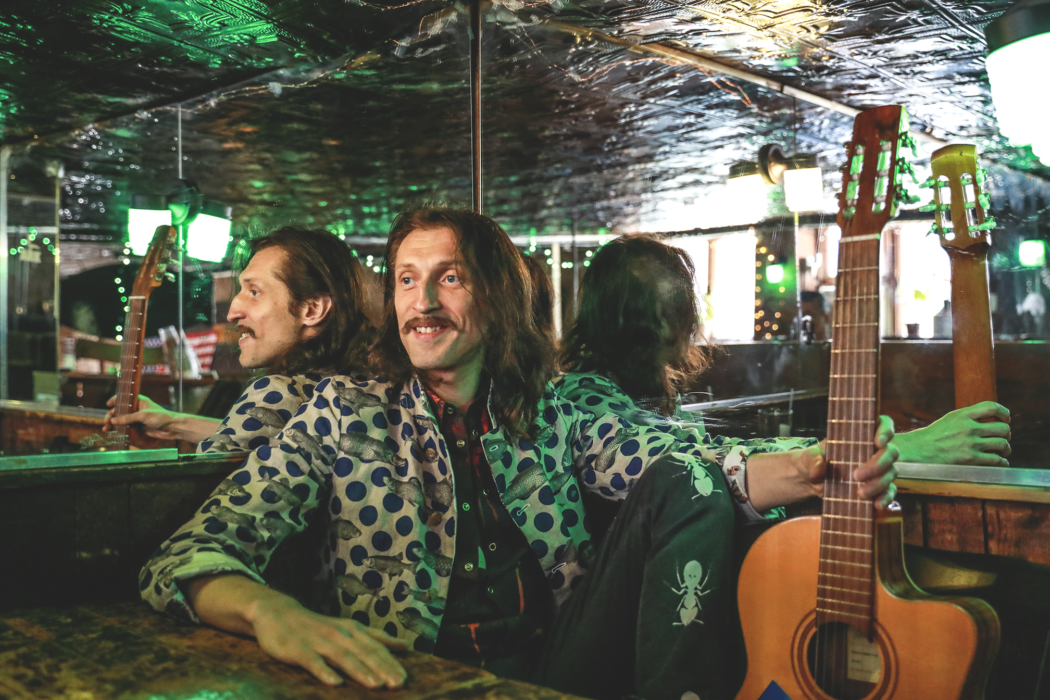
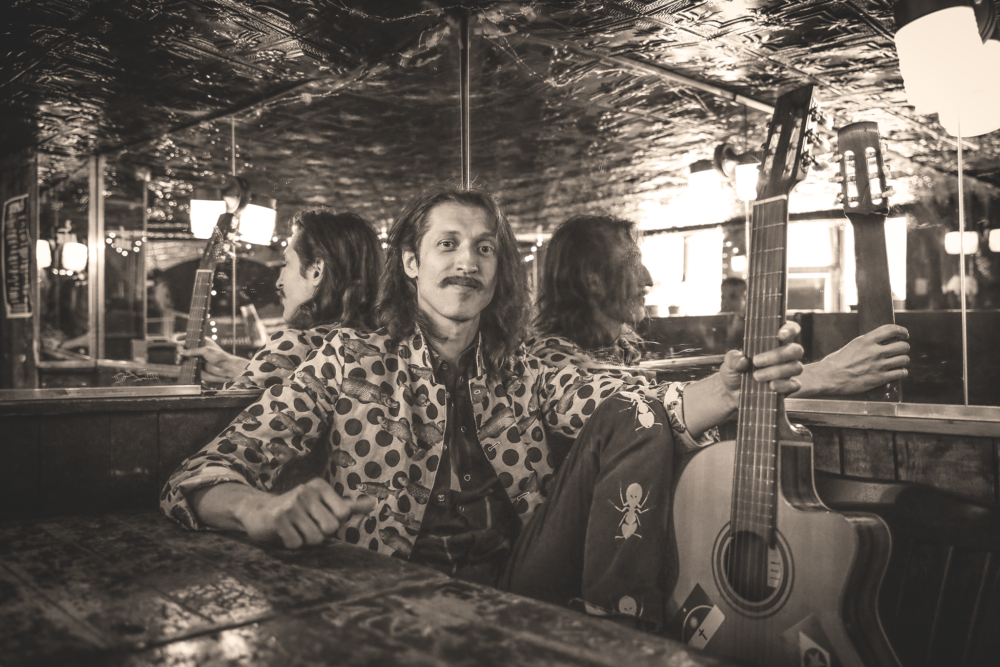
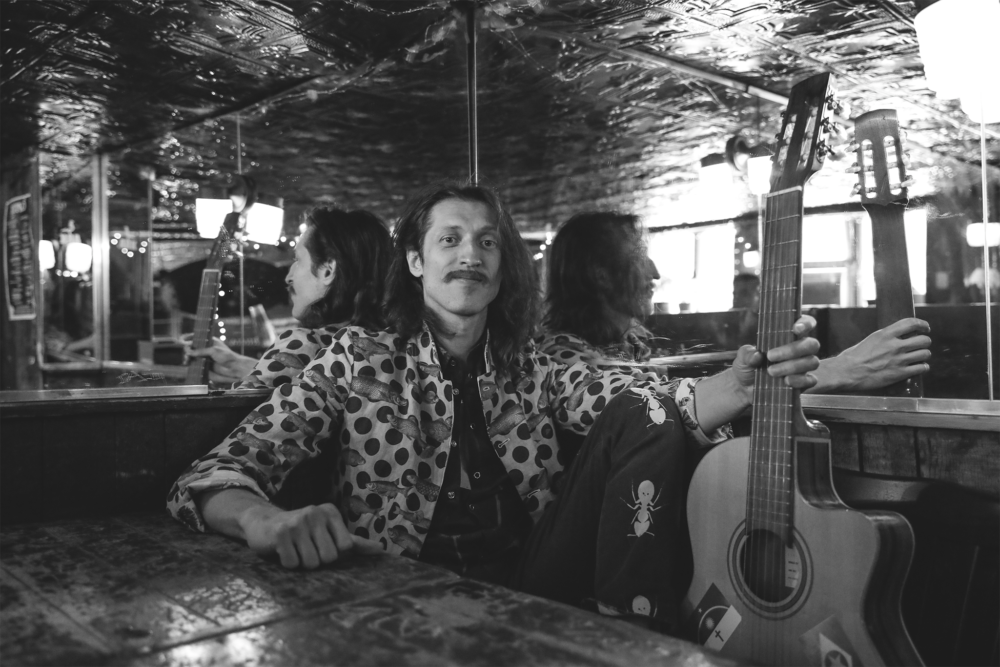
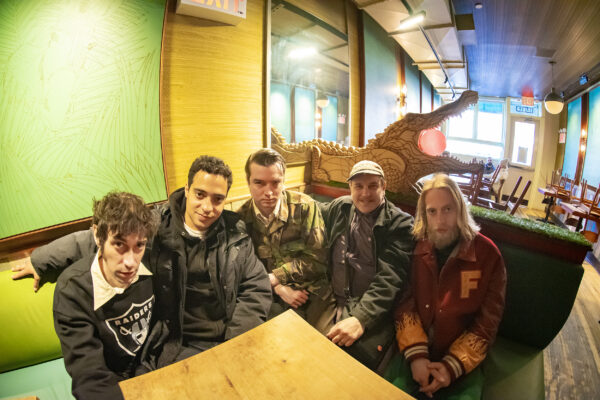
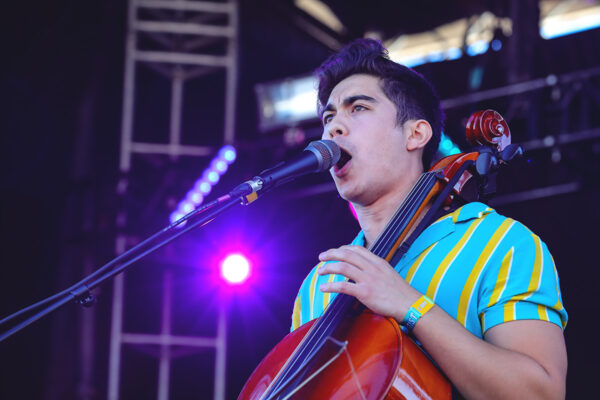

GOGOL BORDELLO GET THE CAP STOMPING ON NIGHT AFTER NEW ALBUM RELEASE - Pancakes And WhiskeyPancakes And Whiskey
[…] and friends – an 8, sometimes 9-person group – the sound was impeccable. As Eugene recently told us over whiskey, their lineup includes representation from all over the globe – Ukraine, Russia, Belarus, […]